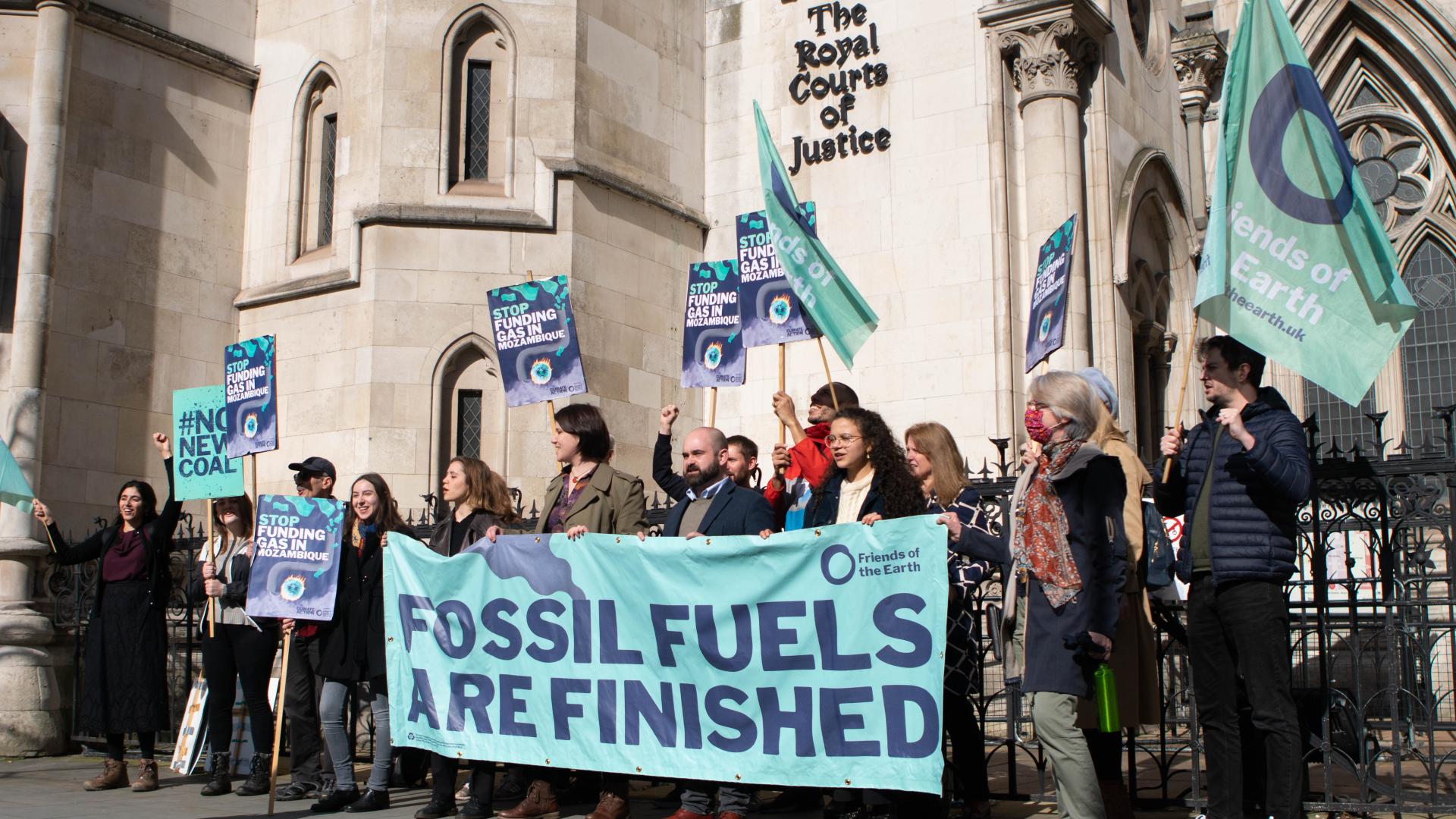21 Jun 2023
We’re very disappointed by this decision. Putting $1.15 billion of public money behind a giant fossil fuel project is clearly the wrong decision in a climate crisis. We said the UK government’s financing of TotalEnergies' liquid natural gas (LNG) plant in Mozambique was unlawful. We're sharing the court papers so people can see our detailed arguments.
Grounds for challenge
We had 2 grounds of challenge. In essence:
- The decision was based on an incorrect understanding of the Paris Agreement. The funding of such a large new fossil fuel project was plainly not consistent with the Agreement when considering the latest science.
- The decision was reached without "lawful enquiry," ie United Kingdom Export Finance (UKEF) failed to take reasonable steps to gather essential information, such as an estimate of the total emissions from the project (including emissions from the end-use of the gas).
Legal documents of the case
The following links will download the PDF of each document automatically.
- Friends of the Earth Briefing from June 2021
- Friends of the Earth's skeleton argument for the main hearing
- Government's skeleton argument for the main hearing
- Transcript of the main hearing
- Divisional Court's Judgment from March 2022
- Divisional Court's Order from March 2022
- Friends of the Earth's Briefing from March 2022
- Friends of the Earth’s skeleton argument for the Court of Appeal hearing
- Friends of the Earth’s supplementary skeleton for the Court of Appeal hearing
- Court of Appeal's Judgment from January 2023
- Friends of the Earth’s grounds of appeal to the Supreme Court
- Supreme Court’s Order from June 2023
Background
In September 2020 Friends of the Earth (England, Wales, NI) issued a legal challenge to the UK Government’s decision to provide around $1.15 billion of UK taxpayer support for a huge liquified natural gas (LNG) development in Mozambique. The decision is one of the largest financial packages for a fossil fuel project ever offered by the UK export credit agency (ECA) – UK Export Finance (UKEF). The potential climate impacts are huge, with the construction phase alone increasing the greenhouse gas emissions of Mozambique by up to 10% by 2022. And those emissions would be dwarfed by the emissions caused by the end-use of the gas, for example in power stations.
In December 2021 our case was heard in the High Court. Because it was a big case, we had two judges sitting rather than one. Among other things, they scrutinised UKEF’s climate assessment and its conclusion that the project was compatible with the Paris Agreement (despite there being no calculation of the total greenhouse gas emissions associated with the project).
Our litigation was the first time a UKEF funding decision had been looked at by the UK courts on climate grounds. In addition to the climate arguments, the case is important because ECA decisions remain largely hidden from the public eye, despite backing controversial projects with not only huge climate impacts but wide-ranging social and human impacts too. We know that large fossil fuel projects with high-risk profiles, such as the Mozambique LNG project, would not be possible without the support of governments and their ECAs from across the world.
In March 2022 the High Court gave its judgment, with the two judges split. One agreed with us that the decision was unlawful, the other concluded it was lawful. They gave us permission to take our case to the Court of Appeal. For more detail see our legal briefing from March 2022.
This challenge was unique in legal terms because an overall consensus was not reached by the court of just 2 judges. This meant that our case couldn't achieve full success, despite the fact that a High Court Justice ruled in our favour.
In December 2022, we took our case to the Court of Appeal, but in January 2023 it rejected our legal challenge. While this ruling was very disappointing, we still firmly believe that UK money can, and should, be pulled from this highly damaging project, which is on course to have a catastrophic impact on our planet. To this end, in February 2023 we filed an appeal to the Supreme Court, but in June 2023 the Supreme Court ruled that our appeal was "unarguable," meaning we can't take the case any further.
This decision is both disappointing and surprising given the strength of our arguments and the 3 starkly different judicial approaches that have been applied to this case.
While this outcome is disappointing, the case has had many successes. We’ve increased the legal scrutiny of the financiers of the Mozambique LNG project, not just in the UK but around the world. Plus launching this case helped secure a UK government policy to stop new investment in international fossil fuels using public funds. The new policy won't stop the investment in Mozambique because that decision had already been taken. But its impact will be felt far into the future and is being replicated worldwide.
Our case forms part of the exciting and growing body of climate change litigation that seeks to rely on the Paris Agreement and keep key actors accountable for climate breakdown. In recent times we have seen similar cases like the huge win of Milieudefensie v Royal Dutch Shell (Netherlands).
We hope these court papers will assist those examining ECA activity and performance in the environmental movement, particularly in relation to climate change due diligence. The documents may be of particular assistance to legal professionals, academics and students.
The Friends of the Earth legal team consists of Jessica Simor KC, Prof. Zachary Douglas KC, Kate Cook, Anita Davies, Gayatri Sarathy, Leigh Day LLP and its own in-house legal specialists.


